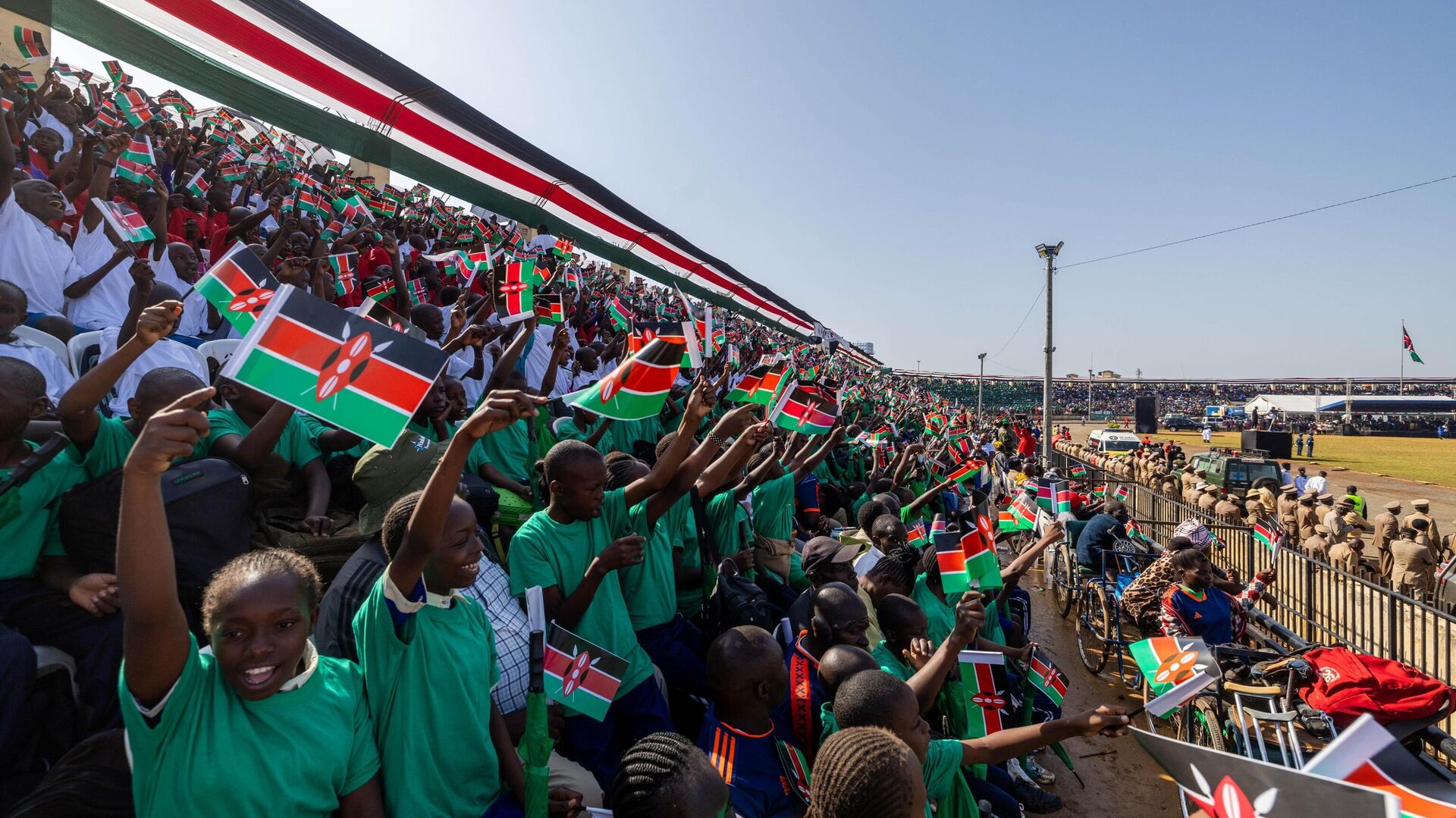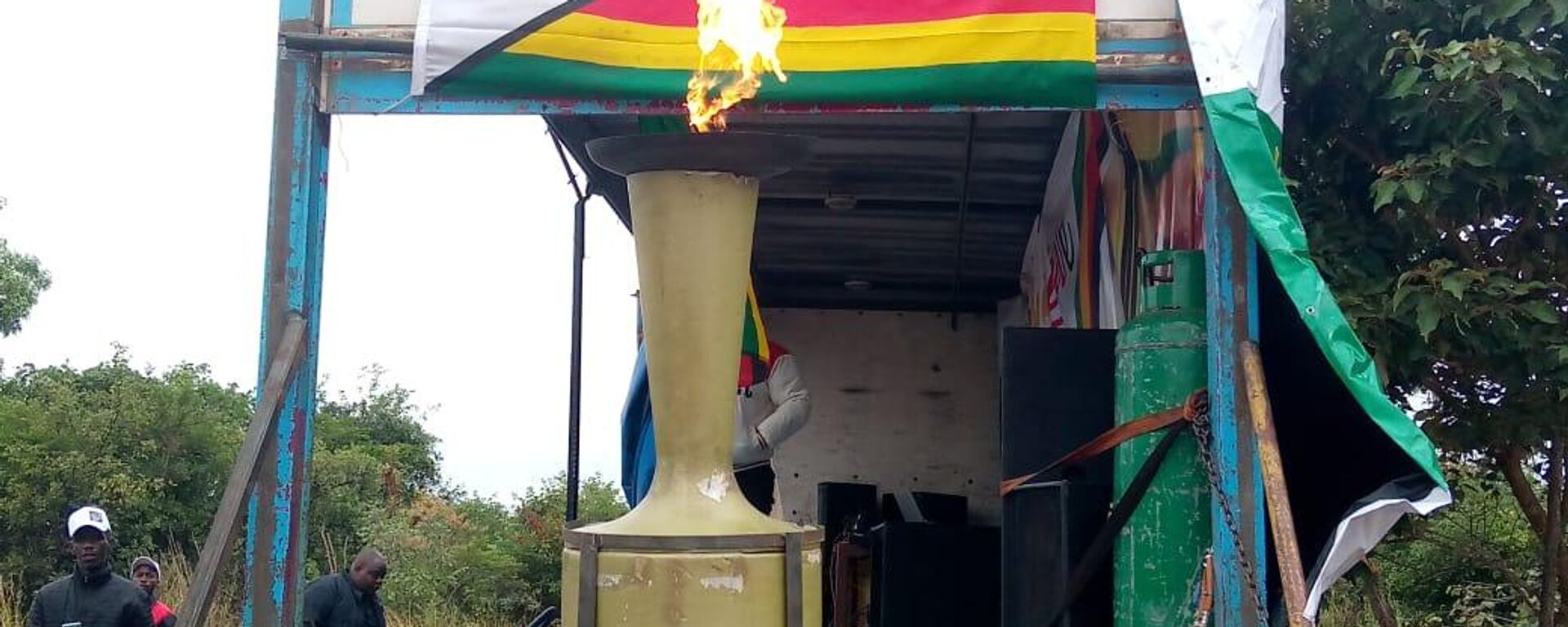https://en.sputniknews.africa/20240601/madaraka-day-celebrating-61-years-of-kenyan-self-government-1066834161.html
Madaraka Day: Celebrating 61 Years of Kenyan Self-Government
Madaraka Day: Celebrating 61 Years of Kenyan Self-Government
Sputnik Africa
On Saturday, Kenya celebrated Madaraka Day — the word “madaraka” means “authority” or “the assignment of authority” in Swahili — on June 1, 1963, the country... 01.06.2024, Sputnik Africa
2024-06-01T18:31+0200
2024-06-01T18:31+0200
2024-06-03T10:55+0200
features
kenya
east africa
william ruto
united kingdom (uk)
sputnik africa
independence
history
british colonialism
national holiday
https://cdn1.img.sputniknews.africa/img/07e8/06/01/1066834898_0:161:3071:1888_1920x0_80_0_0_7f50d6f36aa5c7159bcae4cd8fbc760d.jpg
Speaking at Masinde Muliro Stadium, Bungoma city in the west of the country, Kenya's President William Ruto first of all remembered all those people who fought for the country's independence, reminding fellow citizens that Kenya's "self-governing mandate is not an accident of history [but] rather [...] the affirmation of the timeless values embraced and articulated" by their ancestors.This year, the festival was held under the theme "Agriculture and food security." The president emphasized the importance of the agricultural sector in the country’s economy.He also spoke about government programs to support it.The East African country had been under British rule since 1920. June 1, 1963, was an important step on the path to freedom; on this day, it gained partial independence. This means that Kenya declared its independence from the United Kingdom through the Kenya Independence Act of 1963.However, it was not until a year and a half later, on December 12, 1964, that it completely got rid of the shackles of the Crown's colonialism and became an independent republic.During his speech, Ruto also paid tribute to Kenyan independence figure Masinde Muliro. Back in 1958, he and seven of his colleagues traveled to London to campaign for the release of Jomo Kenyatta (who later became the first president of independent Kenya) and five others. Elected after a long fight to the Legislative Council in March 1957, along with seven others (it was the first time Africans were elected to the council), they launched "Operation Freedom," fighting for freedom of assembly and national political parties.Muliro, along with representatives from different districts in Kenya, demanded constitutional changes as well as an end to discrimination. They also demanded more seats on the council for effective representation, since their constituencies were large.Thanks to these efforts, in 1958, the number of African representatives increased from eight in 1956 to 14. In the same year, he formed the Kenya National Party, a multiracial organization that sought to establish responsible government for Kenya between 1964 and 1968 and full self-government in 1968.
https://en.sputniknews.africa/20240418/zimbabwe-marks-independence-day-celebrating-freedom-from-colonial-rule-1066125843.html
kenya
east africa
united kingdom (uk)
Sputnik Africa
feedback@sputniknews.com
+74956456601
MIA „Rossiya Segodnya“
2024
Christina Glazkova
https://cdn1.img.sputniknews.africa/img/07e7/0b/07/1063380906_0:0:673:674_100x100_80_0_0_79628b4d0cd9f29291a57aa13bbf9e7a.jpg
Christina Glazkova
https://cdn1.img.sputniknews.africa/img/07e7/0b/07/1063380906_0:0:673:674_100x100_80_0_0_79628b4d0cd9f29291a57aa13bbf9e7a.jpg
News
en_EN
Sputnik Africa
feedback@sputniknews.com
+74956456601
MIA „Rossiya Segodnya“
Sputnik Africa
feedback@sputniknews.com
+74956456601
MIA „Rossiya Segodnya“
Christina Glazkova
https://cdn1.img.sputniknews.africa/img/07e7/0b/07/1063380906_0:0:673:674_100x100_80_0_0_79628b4d0cd9f29291a57aa13bbf9e7a.jpg
kenya, east africa, william ruto, united kingdom (uk), sputnik africa, independence, history, british colonialism, national holiday, celebration, agriculture, food security
kenya, east africa, william ruto, united kingdom (uk), sputnik africa, independence, history, british colonialism, national holiday, celebration, agriculture, food security
Madaraka Day: Celebrating 61 Years of Kenyan Self-Government
18:31 01.06.2024 (Updated: 10:55 03.06.2024) Christina Glazkova
Writer / Editor
On Saturday, Kenya celebrated Madaraka Day — the word “madaraka” means “authority” or “the assignment of authority” in Swahili — on June 1, 1963, the country gained partial independence from the UK.
Speaking at Masinde Muliro Stadium, Bungoma city in the west of the country, Kenya's President William Ruto first of all remembered all those people who fought for the country's independence,
reminding fellow citizens that Kenya's "self-governing mandate is not an accident of history [but] rather [...] the affirmation of the timeless values embraced and articulated" by their ancestors.
“On this anniversary, we mark the emphatic success of our freedom struggle, the triumph of the many gallant men and women who made immense sacrifice for the cause of freedom and justice and the vindication of the principles and values which inspire the people of Kenya to stand as one, resist oppression, and unite to claim their sovereignty and to win the freedom to build a nation in accordance with our own aspirations,” Ruto said in his congratulatory speech.
This year, the festival was held under the theme "Agriculture and food security." The
president emphasized the importance of the agricultural sector in the
country’s economy."Our agriculture sector continues to fire the powerful engine of economic transformation to propel this great nation into a food secure, internationally competitive trading giant. [...] Agriculture's direct contribution to our GDP is 25% while its indirect support to other economic pillars such as manufacturing boost the GDP by a further 27%. Agriculture also employs directly or otherwise an estimated 40% of our population," Ruto said.
He also spoke about government programs to support it.
"To build a robust and thriving economy, enhance social inclusion and improve environmental conservation on this critical sector, the government has deployed an agricultural aid, all-of-society approach in the form of the bottom up economic transformation agenda of which agriculture is a critical central strategic pillar," he stated.
The
East African country had been under British rule since 1920. June 1, 1963, was an important step on the path to freedom; on this day, it gained partial independence. This means that Kenya declared its independence from the United Kingdom through the Kenya Independence Act of 1963.
However, it was not until a year and a half later, on December 12, 1964, that it completely got rid of the shackles of the Crown's
colonialism and became an independent republic.
During his speech, Ruto also paid tribute to Kenyan independence figure
Masinde Muliro. Back in 1958, he and seven of his colleagues traveled to London to campaign for the release of Jomo Kenyatta (who later became the first president of independent Kenya) and five others. Elected after a long fight to the Legislative Council in March 1957, along with seven others (it was the
first time Africans were elected to the
council), they launched "Operation Freedom," fighting for freedom of assembly and national political parties.
Muliro, along with representatives from different districts in Kenya, demanded constitutional changes as well as an end to
discrimination. They also demanded more seats on the council for effective representation, since their constituencies were large.
Thanks to these efforts, in 1958, the number of African representatives increased from eight in 1956 to 14. In the same year, he formed the Kenya National Party, a multiracial organization that sought to establish responsible government for Kenya between 1964 and 1968 and full self-government in 1968.



